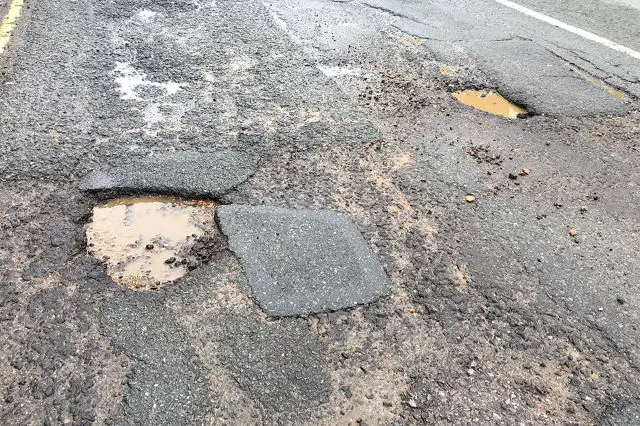Analysis of eight years of public data from the Department for Transport (Dft) has revealed that out of 151 local authorities the Isle of Wight is the fifth worst in the country for maintaining A roads.
The data found that the Isle of Wight – with 121km of A roads – had the fifth highest percentage of A roads (12.5 per cent) in need of maintenance (average from 2009-10 to 2016-17).
This is despite the Highways PFI contractor, Island Roads, declaring to have rebuilt or resurfaced 300km of highway Islandwide since 2013.
“Significant improvements” on B and C roads
The picture is better for the Isle of Wight’s B and C roads though.
The data revealed “there were significant improvements” with the Isle of Wight 59th out of 151 local authorities.
Extended core investment period
The first years of the 25 year Highways PFI contract are what’s referred to as the ‘core investment period’.
Traditionally core investment periods are five years, but at the start of the contract, a longer period (seven years) was negotiated to “seek to minimise disruption, particularly in the tourism season”.
You can read the full detail of what was to be included in the PFI contract on this council press release from 2012.
Compensation claims
Luke Bosdet, the AA’s public affairs spokesman, said:
“Pothole location will be dictated by a number of factors, such as amount and type of traffic, amount and standard of roadworks, and nature of the road (junctions, drainage, etc). Some stretches of road may look particularly ropey, but may have reached the point where it is cost effective for the local authority to resurface them – the locals are moaning like hell, but the council has the work scheduled.
“Local factors can mean that particularly nasty pothole hotspots are often where the roads are under greatest pressure and threaten damage / injuries to larger numbers of road users.
“Cynically, compensation claims to the council for damage to vehicles will be more frequent and greater on busier A roads – while the cost of injuries on minor roads gets passed mostly on to the NHS.”
Response from the council
OnTheWight has approached the council to ask how the Isle of Wight could be positioned as fifth worst in the country, when the PFI contract was four years into the core investment period.
Update 28th March
Seven days later, a spokesperson for the IWC said,
“The data used by the BBC for their recent analysis has been compiled from publicly available information collected annually by the Department for Transport (DfT). A survey of the Island’s roads is conducted each year using a process known as SCANNER where a vehicle equipped with sophisticated laser measuring equipment travels the road network recording a number of parameters which are then used to calculate the condition of the network. This is a process that is accredited to a UK standard to ensure consistency of road assessment across all Council Authorities. This information is then reported to the DfT and made publicly available via its website. Since the commencement of the PFI project in April 2013, Island Roads has fulfilled this obligation on behalf of the Isle of Wight Council.
“The BBC’s approach has been to use 8 years of data in order to calculate an average for the period 2009/2010 through to 20016/2017. Since the commencement of the PFI contract in 2013, Island Roads have conducted the SCANNER surveys in April each year which effectively gives a snap shot of the road condition at the start of each reporting period. The effect of this is that the reported BBC data only represents 3 years of the 7 year PFI investment period and therefore 5 years of the data included in the BBC analysis represents the condition of the Island’s roads prior to the PFI commencing. Focusing on the 3 years of data that falls within the PFI contract it can be seen that the percentage of A roads needing maintenance has improved falling from a high of 18% in 2010/ 11 (pre PFI) to 5% in 2016/17.
“The most recent data included within the BBC analysis was captured by SCANNER during April 2016, making the data almost 2 years old. In the two years since then Island Roads has treated another 170km or carriageway across A, B & C, and U classification of roads which will, without doubt, create a significant improvement to the Island’s UK ranking for highway condition. Island Roads is now preparing for the 2018/19 data submission with carriageway surveys programmed to start after the Easter break.
“With another 2 years of core investment still to be delivered it will not be until the DfT publish its 2019/2020 data that we will have a clear comparison of the benefits of the PFI. It is however clear from all the indicators available at this stage that we are on track towards becoming an Authority with some of the best roads in the UK and we trust that Island residents and businesses are already recognising the improvement in our road network.”
Article edits
21.3.18 – Removed “when Island Roads are approaching the end of its fifth year under the PFI contract” from penultimate paragraph.
28.3.18 – Added comment from the IWC





